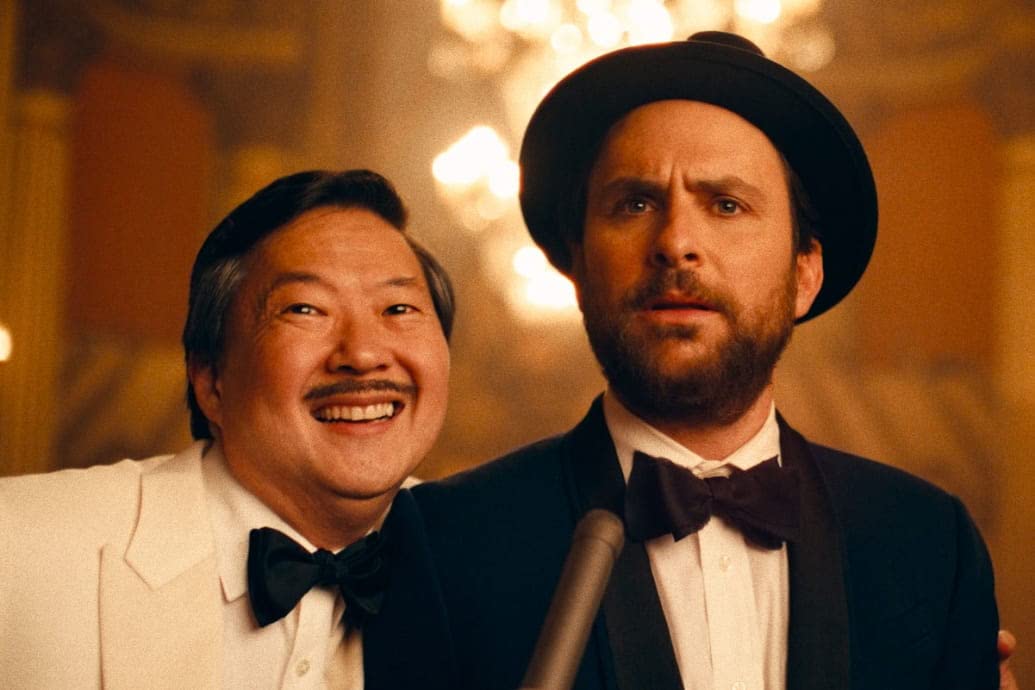Fool's Paradise
Turns out we were the real fool all along...

I started out delighted, but at some point, I realized I was just kinda…bored. I’m not sure when exactly I realized that peak had passed. Was it when the actor playing Billy the Kidd (Charlie Day) accidentally hung himself? And then we cut back to see his pants fall down, causing everyone to think it was autoerotic asphyxiation? Was it when our previously unnamed protagonist (Charlie Day) is mistakenly called “Latte Pronto” by Lenny (Ken Jeong), an overly enthusiastic and dim publicist? And everyone immediately accepts it? Was it when he was slammed into a film called Mosquito Boy, a lazy attempt to satirize the superhero craze? I can’t say for sure. But all those jokes and plot lines happen, and they’re just a sad jumble in my brain as I type this.
Fool’s Paradise is a solid idea: a mute, put upon man whose silence allows him to move though life (Hollywood, specifically) in ways others cannot. It’s an homage to the silent era’s titans of slapstick and their hapless, bumbling physical comedy roles, especially Chaplin and Keaton. I’m not particularly well-versed in either of them, but I’d bet there are even a bunch of specific visual references to their work. His look is certainly inspired by them, especially the hat. And there’s a definitely homage to the ending of The Great Train Robbery, strengthening the connection to early film.
Latte is introduced to us in an exposition dump by a doctor as a man who has mysteriously regressed to a mute, childlike state. And it’s dropped that maybe someone really caring about him unconditionally could snap him out of it (holy foreshadowing, Batman!). He proceeds to be pushed through life never speaking, as everyone he encounters talks enough for both of them that they don’t seem to notice his lack of participation in the conversation. He gets noticed on the street by The Producer (Ray Liotta, in one of his final roles) and brought onto a movie set as a body double. When the lead dies suddenly, Latte takes over and becomes a star, living the high (and fast) life before making his next film. During its filming, he lands in the hospital, and is forced to witness the film’s completion from the outside.
Missing from that description are Pronto’s desires. Because they’re missing from the film.
Here’s the thing. I appreciate the idea that people in Hollywood are so self-absorbed that they’ll project whatever they want to see onto anyone. It’s not fresh, but it’s coherent, and it lends itself to heightening in a way that can make for some fun situations. A handful of which we get in the film, such as The Producer not realizing Pronto is mute until he’s about to step on camera, at which point The Producer declares “Do nothing; works for tons of actors.” But the movie gets so lost in that fairly shallow comment that it just plays like a sequence of scenes that happen because they’re in the script. Yeah, I can draw a line for you indicating cause and effect how we get from one scene to another. But through all of it, Latte is absurdly passive, immediately accepting his lot each time. He doesn’t even really struggle or try to correct people or get away or anything. He just looks incredibly dazed throughout the whole saga. I haven’t seen Day in anything else (just a few voice roles), so I can’t speak to his quality as an actor, but here his face has two modes: confused, or panicked. All of which makes him feel like a flat, one-dimensional character with no inner life, not even one to which we aren’t privy.
Instead, the plot is driven by various repetitions of the idea mentioned above: that Hollywood is full of oblivious idiots who pay no mind to each other, where dimwits thrive (see the title). Many never seem to realize Latte doesn’t speak, including Christiana Dior (Kate Beckinsale), to whom he’s briefly married. But most take it as a deliberate choice to be mysterious and declare him a genius, such as his co-star Chad Luxt (Adrien Brody). Maybe it would work if he actually did anything. But as is, that no one actually stops talking long enough for him to respond stands out like a sore thumb instead of feeling poignant. As does that everyone interacts with him in basically the same exact way; all the sameness gets tiring.
The comedy is pretty okay. It’s definitely uneven, although I’d bet the later stuff would have hit more often for me if the movie’s story and plot were more engaging. But even then, it also gets repetitive. Lenny’s whole deal is pretty amusing, but it gets a little weary by the end of his first scene, and Jeong has exhausted us by the end. Day’s physical humor works pretty well, and his freak out face is entertaining. But there are so many good jokes left on the table, preferring instead easy ones showcasing little creativity.
This comes out a pretty forgettable film, which is quite disappointing. It does make me want someone to take another shot at a character inspired by The Tramp, though. Which has to count for something.